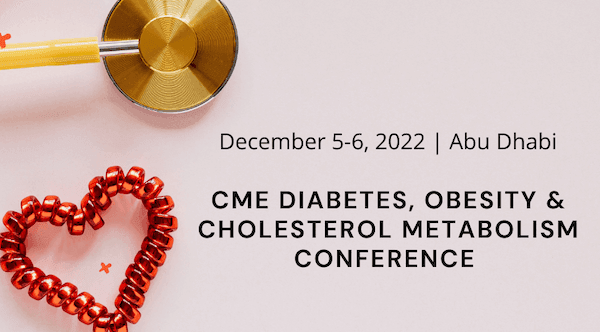- Track-1 : Obesity: Diet and Nutrition
Obesity is a condition characterized by excessive body fat, which can lead to a range of health problems, including diabetes, cardiovascular disease, cancer, stroke, and dementia. To maintain a healthy weight and prevent these conditions, it is important to follow a balanced and nutritious diet and engage in regular physical activity. Avoiding trans-fatty foods and sticking to a healthy meal plan can help to prevent obesity and improve overall health. The importance of nutrition in preventing and treating obesity has gained increased recognition in recent years.
- Track-2 : Obesity and Diabetes
Being overweight or obese increases the risk of developing type 2 diabetes, also known as insulin-resistant or adult-onset diabetes. In this condition, the body’s cells become resistant to the effects of insulin, a hormone that helps the body convert glucose into energy. As a result, blood glucose levels remain persistently high, leading to diabetes. This condition can be prevented by maintaining a healthy weight and engaging in regular physical activity.
- Track-3 : Obesity and Cancer
Being overweight or obese has been linked to increased risks of developing several types of cancer, including esophageal adenocarcinoma, gastric cardiac cancer, liver cancer, multiple myeloma, meningioma, pancreatic cancer, colorectal cancer, and gallbladder cancer. This may be due in part to chronic low-level inflammation caused by excess fat tissue, which can lead to DNA damage and increase cancer risk over time. Overweight and obese individuals are also more likely to have conditions that are associated with chronic local inflammation, which can further increase cancer risk. In addition, fat tissue produces excess amounts of estrogen, high levels of which have been linked to increased risks of breast, endometrial, ovarian, and some other cancers. High levels of insulin and IGF-1, which are often found in obese individuals, may also promote the development of certain cancers, including colon, kidney, prostate, and endometrial cancers.
- Track-4 : Endocrinology and Cholesterol Metabolism
Endocrinology is the study of the endocrine system, which is made up of organs that release hormones that regulate many of the body’s functions. Examples of endocrine organs include the testes, ovaries, pancreas, pituitary gland, and thyroid gland.
In diabetes, cholesterol absorption is decreased and cholesterol biosynthesis is increased. This increase in cholesterol synthesis can be reduced by insulin. Previous research has shown that low cholesterol absorption efficiency is commonly found in diabetic individuals with mild hyperlipidemia and in those who are moderately overweight. In type 2 diabetes, obesity, and conditions such as cortisol excess, raised insulin levels are often found along with insulin resistance. Lack of insulin can also lower the level of “good” cholesterol, but when insulin is given and well-controlled, HDL levels tend to return to normal.
- Track-5 : Childhood Obesity and Diabetes
Childhood obesity is one of the most serious public health challenges of the 21st century. The problem is global and is increasingly affecting low- and middle-income countries. The prevalence of obesity has risen at an alarming rate. In 2018, it is estimated that there were more than 54 million overweight children under the age of five worldwide.
Overweight and obese children are more likely to remain obese into adulthood and are at greater risk of developing non-communicable diseases such as diabetes and cardiovascular disease at an earlier age. Fortunately, both obesity and the related diseases are largely preventable. Therefore, preventing childhood obesity should be a top priority.
- Track-6 : Obesity and Weight Management
The global obesity epidemic is a growing concern, with many people motivated to lose weight for aesthetic reasons. However, weight loss can also have significant health benefits, such as reducing the risk of chronic diseases and improving prognosis. Unfortunately, losing weight can be challenging, especially for those who are trying to quit smoking, as they tend to gain weight. There are many weight loss programs available, but they are often expensive and not accessible to all. Athletes who are obese and fit may struggle to maintain their weight after retirement, increasing their risk of developing health problems. Bariatric surgery can be an effective option for morbidly obese individuals, but it carries its own risks and side effects. Weight loss medications can also be helpful, but they may have adverse effects and require lifestyle changes for optimal effectiveness.
- Track-7 : Cholesterol and Lipid Metabolism
Cholesterol is a vital lipid for mammalian cells, and its levels are carefully regulated in the body. Disruptions in cholesterol homeostasis have been linked to a range of cardiovascular diseases, including atherosclerosis. The endoplasmic reticulum plays a central role in regulating cholesterol levels in the body. After lipids are ingested, they are broken down by enzymes and absorbed in the small intestine. They are then transported through the lymphatic system into the bloodstream. These hydrophilic apolipoproteins control fat metabolism and have different proportions of bound fat as well as different functions. Elevated levels of low-density lipoprotein (LDL) and triglycerides are associated with an increased risk of atherosclerosis, while an increase in high-density lipoprotein (HDL) has a protective effect on blood vessels.
- Track-8 : Diabetes, Obesity and Metabolic Syndrome: Stroke and Cardiac Health
Metabolic syndrome is a group of conditions that occur together and increase the risk of stroke, type 2 diabetes, and heart disease. These conditions include high blood pressure, high blood sugar, excess abdominal fat, and abnormal cholesterol or triglyceride levels.
Heart disease and heart attack: When the arteries that supply blood to the heart become narrowed or blocked by fatty deposits known as plaque, they can reduce the amount of blood and oxygen reaching the heart, causing chest pain or a heart attack.
Type 2 diabetes: Diabetes occurs when the body is unable to produce enough insulin or is unable to use insulin properly. This leads to high levels of sugar in the blood and increases the risk of cardiovascular disease and kidney failure.
- Track-9 : Obesity, Diabetes and Pregnancy: Risks and Management
Maternal obesity is a common risk factor in obstetric care. Women who are obese before pregnancy are at higher risk of miscarriage, induced labor, gestational diabetes, complications with anesthesia, preeclampsia, venous thromboembolism, cesarean section, wound infections, and difficulty initiating or maintaining breastfeeding compared to women with a healthy pre-pregnancy weight. Babies of obese mothers are also at increased risk of stillbirth, prematurity, congenital anomalies, macrosomia, and neonatal death.
- Track-10 : Bariatric Surgery and Advanced Treatments of Diabetes
Common treatments for obesity and overweight include losing weight through diet, healthy eating, and physical activity. In some cases, individuals may be unable to lose enough weight to improve their health or maintain their weight loss. In these situations, a doctor may recommend additional treatments such as bariatric surgery, weight-loss medications, or weight-loss devices. Bariatric surgery may be the best option for those with extreme obesity who have not been successful with other weight loss methods.



